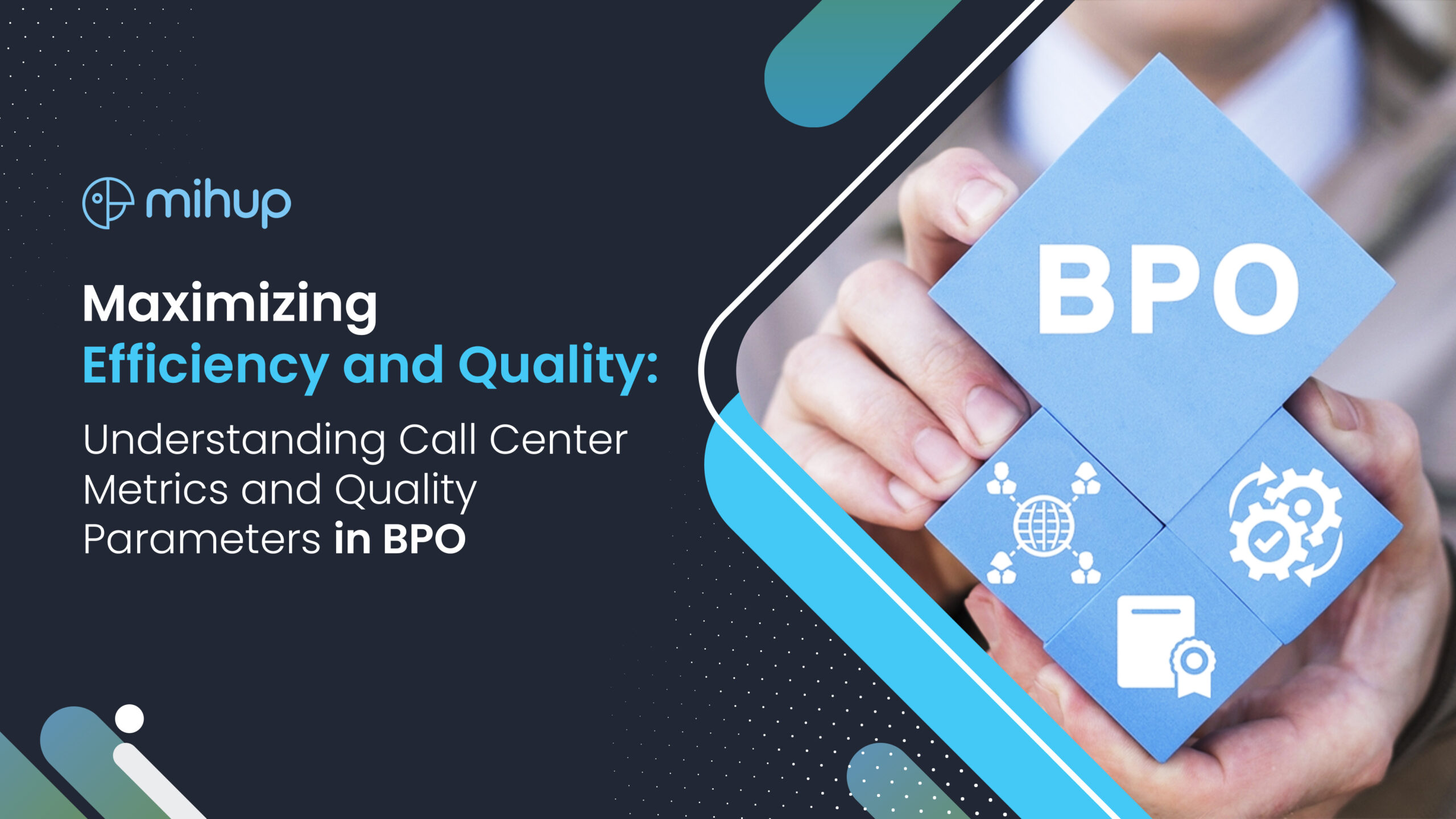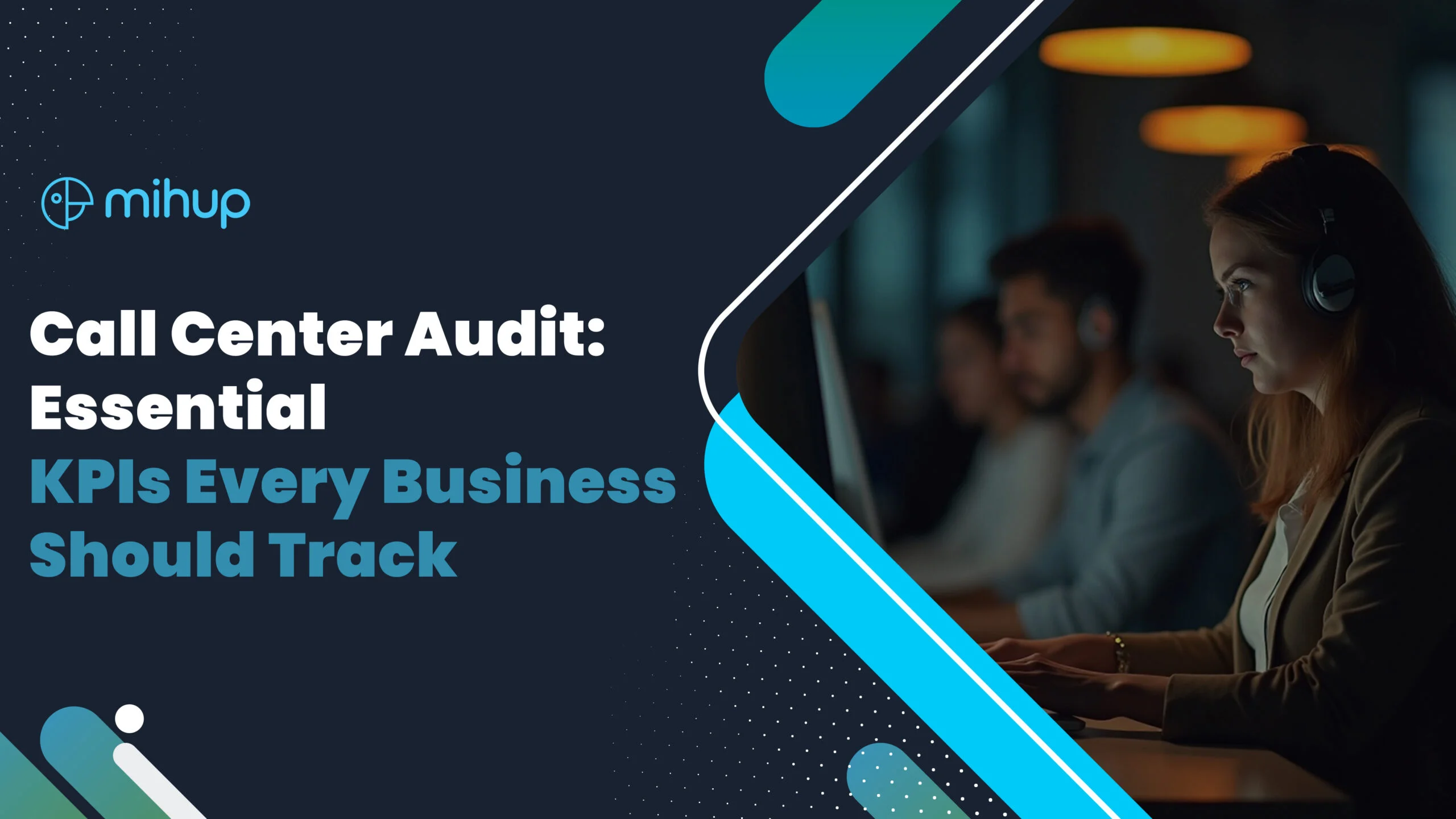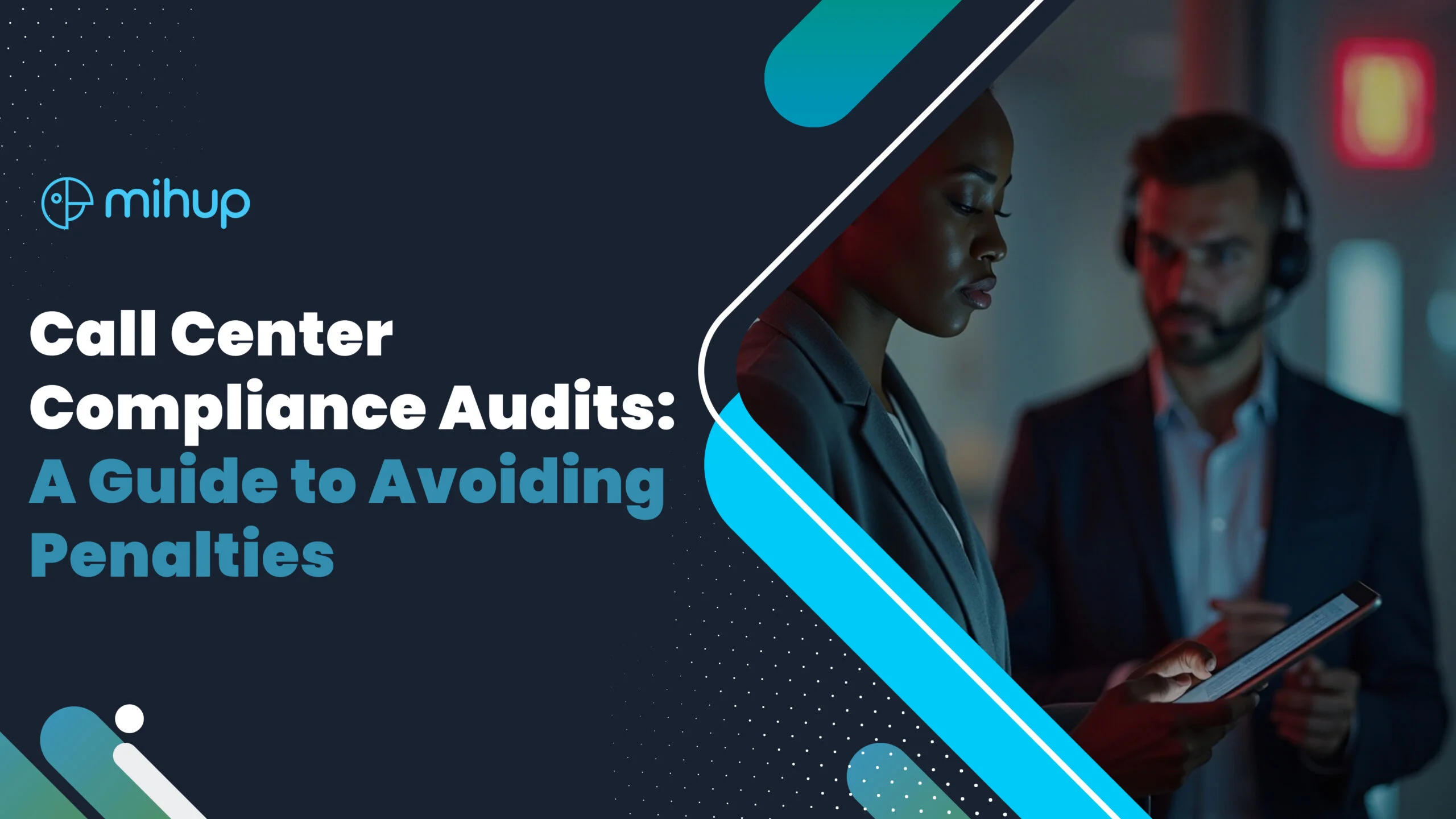For any BPO company (business process outsourcing), maintaining optimal call quality parameters is extremely crucial. Call centers serve as vital hubs for customer interactions for their clients (other D2C businesses), making it imperative for BPOs to monitor and improve their performance continuously. This is where call center metrics come into play, serving as indispensable tools for assessing performance, enhancing efficiency, and ensuring customer satisfaction.
What are Call Center Metrics?
Call center metrics are quantifiable measures used to evaluate various aspects of call center performance. These metrics encompass a wide range of parameters, including efficiency, productivity, customer satisfaction, and quality of service. By tracking these metrics, BPOs can gain valuable insights into their operations and make data-driven decisions to optimize performance.
Read our blog: Understanding the Importance and Benefits of Contact Center Metrics and KPIs
Types of Metrics as Quality Parameters in BPOs
Quality parameters in BPOs encompass metrics that focus on the quality of customer interactions and service delivery. These metrics serve as benchmarks for assessing the effectiveness of call center agents and the overall performance of the contact center. Some key quality parameters include:
First Call Resolution (FCR)
First Call Resolution (FCR) is a key performance indicator (KPI) that measures the percentage of customer inquiries or issues resolved during the initial contact with the call center, without requiring subsequent follow-up calls or escalations. Essentially, it evaluates the efficiency and effectiveness of call center agents in addressing customer needs on the first interaction. A high FCR indicates that agents possess the necessary skills, knowledge, and resources to resolve customer issues promptly and satisfactorily, leading to enhanced customer satisfaction and loyalty. FCR is often considered a critical metric in BPOs as it not only signifies operational efficiency but also reflects the quality of service delivery and the ability to meet customer expectations efficiently.
Read our blog: First Call Resolution: Unlocking the Customer Service Superpower
Average Handling Time (AHT)
Average Handling Time (AHT) is another essential metric used to evaluate the efficiency of call center operations. It represents the average duration of customer interactions, including the time taken by agents to handle calls, address customer inquiries, and resolve issues. AHT encompasses various stages of customer interaction, from initial greeting to issue resolution or escalation. While shorter AHT is generally desirable as it indicates faster problem resolution and increased agent productivity, it’s crucial to maintain a balance to ensure that the quality of service is not compromised. AHT optimization involves streamlining processes, enhancing agent efficiency, and providing adequate training and resources to handle customer inquiries effectively within a reasonable timeframe.
Read our blog: Understanding AHT in BPOs
Call Quality Parameters
Call Quality Parameters encompass a range of metrics that assess the quality of customer interactions and the performance of call center agents. These metrics focus on communication, professionalism, and service delivery, aiming to ensure consistent and high-quality customer experiences. Key call quality parameters include:
- Professionalism: Evaluates agents’ communication skills, demeanor, and ability to engage with customers professionally and courteously.
- Adherence to Scripts: Measures agents’ compliance with prescribed scripts or guidelines to maintain consistency in messaging and ensure that essential information is conveyed accurately.
- Empathy: Assesses agents’ ability to understand and empathize with customers’ emotions, concerns, and needs, fostering rapport and trust during interactions.
- Resolution Accuracy: Evaluates the accuracy and effectiveness of issue resolution, ensuring that customer inquiries are addressed comprehensively and satisfactorily.
Monitoring call quality parameters enables BPOs to identify areas for improvement, provide targeted training and coaching to agents, and enhance overall service quality and customer satisfaction.
Customer Satisfaction Score (CSAT)
Customer Satisfaction Score (CSAT) is a metric used to measure customers’ satisfaction levels based on their feedback or surveys following interactions with the call center. It provides valuable insights into overall customer sentiment and perception of the service provided. CSAT surveys typically ask customers to rate their satisfaction with the support received, the resolution of their issue, and the professionalism of the agent, among other factors. Analyzing CSAT scores enables BPOs to gauge customer satisfaction levels, identify areas for improvement, and prioritize initiatives to enhance the customer experience. By focusing on improving CSAT scores, BPOs can drive customer loyalty, retention, and advocacy, ultimately contributing to business growth and success.
Importance of Call Quality Parameters for BPOs
Call quality parameters are instrumental in determining the effectiveness and success of BPO operations. Here’s why they are crucial:
Customer Satisfaction
High-quality interactions directly correlate with increased customer satisfaction. By ensuring that customer inquiries are addressed promptly, accurately, and courteously, BPOs can foster loyalty and retention. Satisfied customers are more likely to recommend the company to others, leading to positive word-of-mouth referrals and sustained business growth.
Brand Image and Reputation
The quality of customer interactions profoundly influences a company’s brand image and reputation. Poor call quality can tarnish a company’s reputation, erode trust, and drive customers away. Conversely, delivering superior service enhances brand perception, builds customer trust, and strengthens brand loyalty. A positive reputation attracts new customers and retains existing ones, contributing to long-term business success.
Operational Efficiency
Monitoring call quality parameters enables BPOs to identify areas for improvement and optimize operational efficiency. By analyzing metrics such as first call resolution (FCR), average handling time (AHT), and call quality scores, BPOs can pinpoint bottlenecks, inefficiencies, and areas for process enhancement. Implementing targeted training programs, process improvements, and technology upgrades improves agent performance, reduces errors, and streamlines operations, ultimately enhancing overall efficiency and productivity.
Regulatory Compliance
In industries with strict regulations, such as healthcare or finance, adherence to call quality parameters is essential for compliance. Call centers must adhere to industry-specific standards, protocols, and regulations to ensure data privacy, security, and confidentiality. Failure to meet quality standards can result in penalties, fines, or legal repercussions, jeopardizing the company’s reputation and financial stability. Monitoring call quality parameters helps ensure compliance with regulatory requirements, mitigating risks and liabilities associated with non-compliance.
How Call Quality Parameters Measure Business Success
Call quality parameters serve as key performance indicators (KPIs) that help measure business success in several ways:
- Customer Retention and Loyalty: High-quality interactions contribute to increased customer satisfaction, loyalty, and retention. By monitoring call quality parameters, BPOs can assess their ability to meet or exceed customer expectations, driving customer loyalty and long-term relationships.
- Brand Perception and Reputation: Delivering superior service enhances brand perception and strengthens customer trust. Positive feedback and high call quality scores reflect positively on the company’s reputation, attracting new customers and retaining existing ones.
- Operational Efficiency and Productivity: Monitoring call quality parameters enables BPOs to identify opportunities for process improvement and operational efficiency. By optimizing agent performance, reducing errors, and streamlining operations, BPOs can enhance productivity and profitability.
- Compliance and Risk Management: Adherence to call quality parameters ensures compliance with industry regulations and standards, mitigating risks and liabilities associated with non-compliance. By maintaining quality standards, BPOs safeguard their reputation, financial stability, and legal standing.
Call quality parameters serve as barometers of business success, reflecting the company’s commitment to delivering exceptional service, maintaining operational excellence, and ensuring regulatory compliance. By prioritizing call quality and continuously improving performance based on these parameters, BPOs can drive customer satisfaction, enhance brand reputation, and achieve sustainable growth in a competitive marketplace.
Speech Analytics: Empowering BPOs to Maintain Call Quality Parameters
Speech analytics plays a pivotal role in enhancing quality and influencing quality parameters within BPOs. This technology harnesses advanced algorithms to analyze and derive insights from customer interactions, thereby empowering BPOs to maintain high standards of service delivery. Here’s how speech analytics contributes to improving quality parameters:
Enhancing Quality Monitoring and Evaluation
Speech analytics software automatically transcribes and analyzes call recordings, allowing BPOs to assess adherence to various call quality parameters. These parameters include script compliance, tone of voice, and resolution accuracy. By scrutinizing these aspects, BPOs can pinpoint areas for improvement and offer targeted feedback to agents, thereby enhancing overall service quality.
Uncovering Trends and Patterns
Speech analytics uncovers valuable trends, patterns, and recurring issues within customer interactions. By identifying common concerns or challenges faced by customers, BPOs can proactively address these issues, streamline processes, and elevate service delivery standards. This proactive approach enables BPOs to enhance customer satisfaction and loyalty.
Optimizing Agent Performance Management
By tracking key performance indicators (KPIs) of quality analysts and contact center KPIs, speech analytics facilitates efficient agent performance management. Supervisors can leverage speech analytics insights to monitor agent performance, identify coaching opportunities, and provide personalized feedback. This targeted approach enhances agent effectiveness and contributes to improved service quality across the board.
Ensuring Regulatory Compliance
Speech analytics plays a crucial role in ensuring regulatory compliance within BPOs. By analyzing calls for specific keywords or phrases related to regulatory requirements, speech analytics detects potential compliance violations. This proactive monitoring helps BPOs adhere to industry regulations, minimizing the risk of penalties or legal repercussions associated with non-compliance.
Call center metrics play a vital role in driving performance and ensuring quality service delivery in BPOs. By monitoring quality parameters, such as call quality parameters and KPIs of quality analysts in BPOs, organizations can enhance customer satisfaction, improve operational efficiency, and maintain regulatory compliance. Leveraging tools like speech analytics further empowers BPOs to extract actionable insights from customer interactions, driving continuous improvement and excellence in service delivery. Embracing a data-driven approach to call center management is essential for BPOs seeking to thrive in a competitive marketplace and deliver unparalleled value to their clients and customers.





